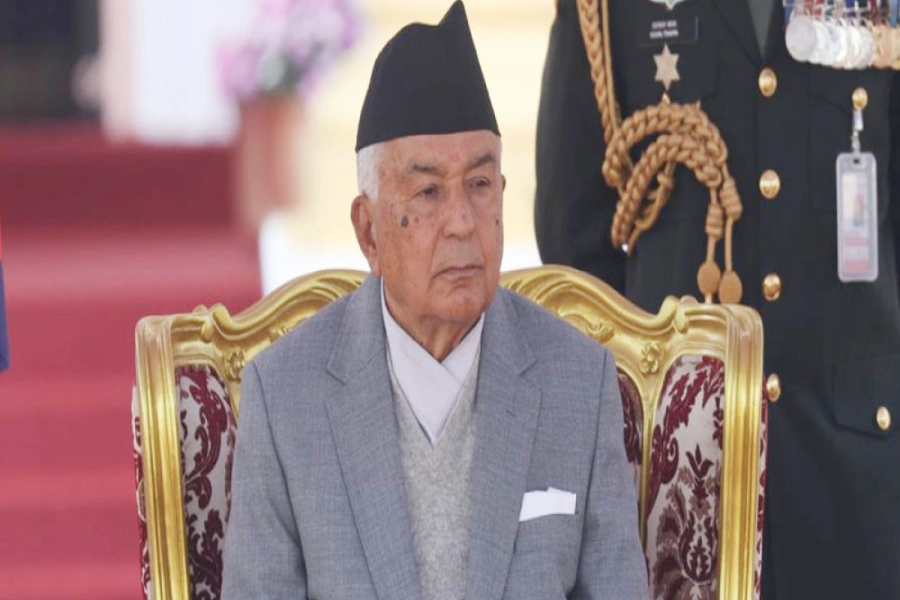Young Nepali shoe designer and a businessman, Ahmed Dulla is a unique man in many ways. He is probably the first shoe designer in Nepal to have a brand named after himself, and yet has no factory of his own and operates from his workshop inside his bedroom. He is a solo man working for his brand, designing his shoes as well as making them without anybody else assisting him.[break]
With all those rather unconventional working methods, Dulla is in the process of being one of the leading shoe designers in Nepal. His leather footwear products are entirely custom-made and durable, and are pretty famous, especially among young ladies in Kathmandu and Pokhara.
The Week met Dulla to talk about his work, methods and the shoes market in Nepal.
How did you decide to design shoes?
I have always been fascinated with shoes. Even when I was young, I used to drag my parents from shop to shop to get the best pair of shoes in town. As a young boy, I spent hours admiring footwear and picking out the most expensive pairs of shoes from shops.
Then there came the time when I fell in love with the game of basketball, and I had a dream to play for the National Basketball Association (NBA) too. I would go to watch basketball matches partly because I was interested in the game and partly because I liked the shoes they wore while playing the game.
This fascination with the game and the sneakers the players wore during the game helped me realize that there was nothing I would love doing than designing shoes.
By Keshab Thoker
How has your family’s reaction been to your decision so far?
At first, my parents were quite shocked to know that I wanted to become a shoe designer. And I don’t blame them, for still today, any works associated with shoes are attributed to the so-called lower-caste people in our society. My parents and relatives used to mock me as I had chosen a job which, according to them, would be done only by cobblers. But I wasn’t discouraged, and I chose to move ahead.
Today, despite the skepticism that was present at first, my parents are very happy with me. They are glad that my choice hasn’t failed me and now I also stand as an example for the kids in my family.
How was your experience studying at the Footwear Design and Development Institute (FDDI) in India?
To tell the truth, I never liked studying. Studying at school really bored me. I hated studying so much that at one point, I wanted to become a taxi driver (laughs). But that all changed when I enrolled at the FDDI. Within a few weeks, I knew I had made the right choice and found my courses so interesting that I attended all my classes regularly for the three years there. I also ended up winning an award for best attendance.
A lot of my friends would skip lessons but I never did. The fact that it was all 80% practical made my studies more intriguing. And above all that, I was the only Nepali studying there in my time.
In a way, yes, I was very hungry to learn this art of shoes that I never actually missed a chance to know something new everyday.
How was your experience as an intern working at Aldo and Zara in Mumbai?
Aldo and Zara are two big shoe companies based in Mumbai, and working with them obviously was something big. The experience was good there. I was able to gain a basic idea of how works are done in a shoe factory and enhance my knowledge on designing and making of shoes.
But at the same time, I realized that if I kept on working like that, under somebody else, I would never be successful. My life would go nowhere.
Over all, the job at Aldo and Zara was not very interesting and was no different than a normal six to nine job. The personal decisions of interns were not taken seriously, and I would constantly feel exploited and not credited for my designs. Then I knew that I couldn’t work under someone else and had to start something on my own. So I came back to Nepal and started working here.
How has your experience been working here in Nepal?
I came to Nepal because I wanted to do something for my country. But at first, I wasn’t getting much support at work. I worked with Shikhar Shoes and Sky Shoes for some time, sharing my knowledge in the field. But I was quite disappointed at how very few people took my advice seriously. So I left the companies and started my own line of designs.
It’s been three months since I first launched my line, and so far, it’s all been very encouraging. My high heels collection and summer flat collection were well received by people. After my first collection was launched, about 70 pairs of my shoes were sold out in a month. The second time, it took hardly a week to sell out the same number of pairs of shoes. Actually, as I have no store of my own, I have to depend entirely on social media to advertise myself and my shoes, and till now, the responses have been very good.
I design my shoes, make them and then deliver them to my customers myself. My customers find it rather strange to find me at their doorsteps. The job is hard but relatively the burden is less than it previously was. I’ve grown close to my customers and they find it safe to buy my shoes as they trust that, since I deliver the shoes myself, there are no chances of my products being bogus.
People also buy my shoes and send them abroad to their friends and families. It indeed feels very good to have such recognition right at the beginning of my career.
Who are your target customers?
I design mostly for ladies as they are my biggest buyers. I also design for men. But as women and girls are the ones with tremendous fetish for shoes, it is safe from a business point of view to have more women’s designs. Women buy about five to six pairs at once, but with men, such cases are rare.
Earlier, I designed shoes for women between the ages of 18 to 30 years. Now, as a lot of people have been demanding my shoes, the range has widened. Now I design shoes for women aged 18 to 60.
What makes Dulla Shoes better than other footwear brands that dominate the Nepali market at present?
My aim from the very beginning of my business has been to knock out the Chinese shoe market here in Nepal. So I’ve been much focused to make my shoes stand out as better choices.
All of my shoes are handmade and of leather, unlike most shoes available here. When my shoes break, I repair them myself, and when the shoes are damaged beyond repair, I give my customers brand new shoes. That doesn’t happen with the other shoe brands.
What do you think of the future of this business in Nepal?
Shoes are a basic necessity. The market share of shoes in Nepal is quite big too. So I believe the future of shoe designing and making in Nepal is very bright. Also, there are many job opportunities in this field. People should learn to grasp them and give their hearts and souls to it. Just as with other fields, without interest and persistent hard work, one can’t aim to achieve success in shoe business anywhere.
Also, there are a lot of investment opportunities in this field. In my case, now, since a lot of people know about my shoes, they want to invest in my shoemaking. So, from a business perspective, too, there’s a good scope of shoe designing here.
Nepali companies have good technical knowledge but scarcely any creative and designing skills. A lot of people in this field aren’t enthusiastic enough. If we can train and motivate young students and people working in this field, I believe we can do better.
ashis.d.updhyay@gmail.com
Putting Yourself in his Shoes: AHMED DULLA!!!






































